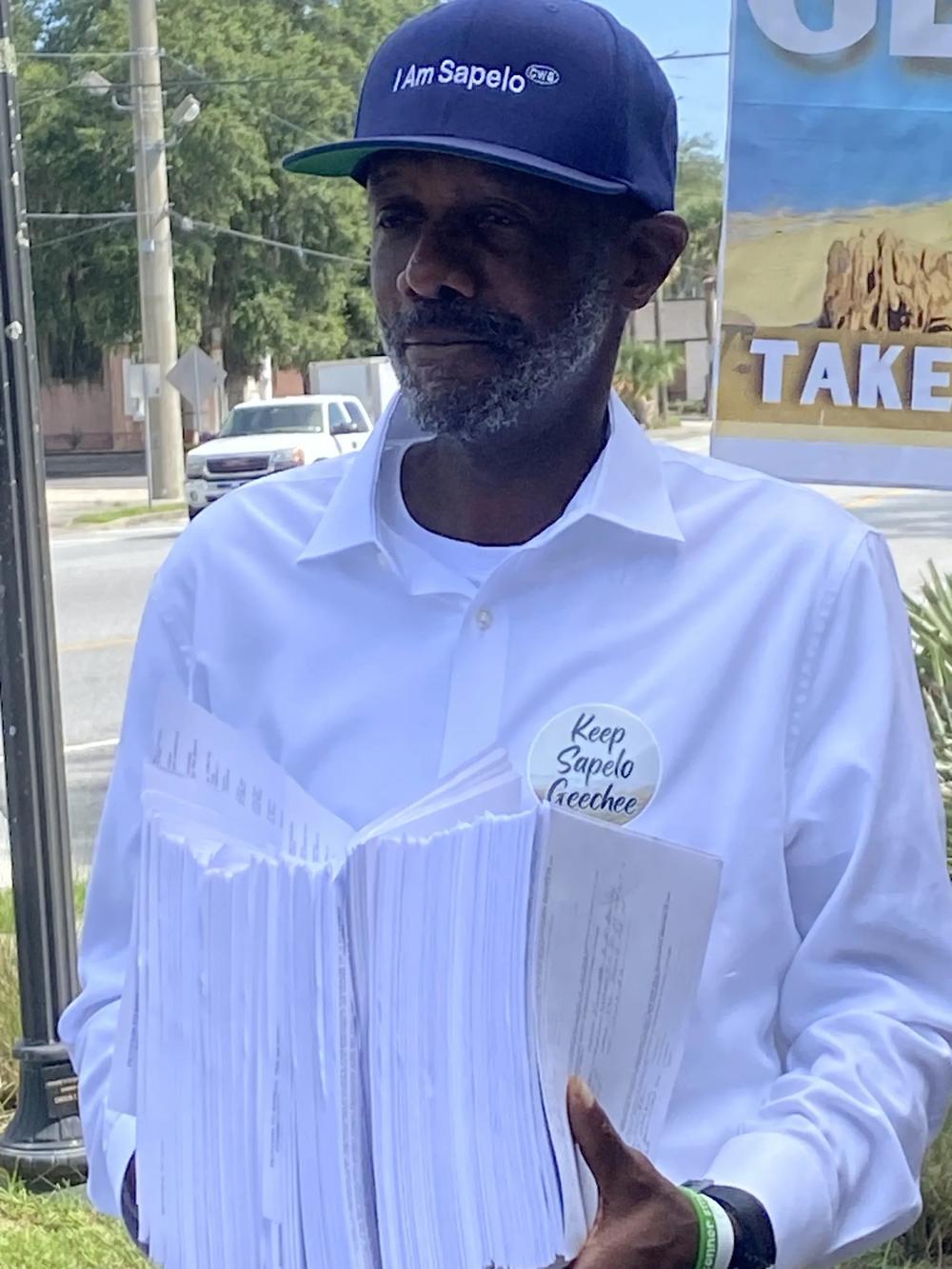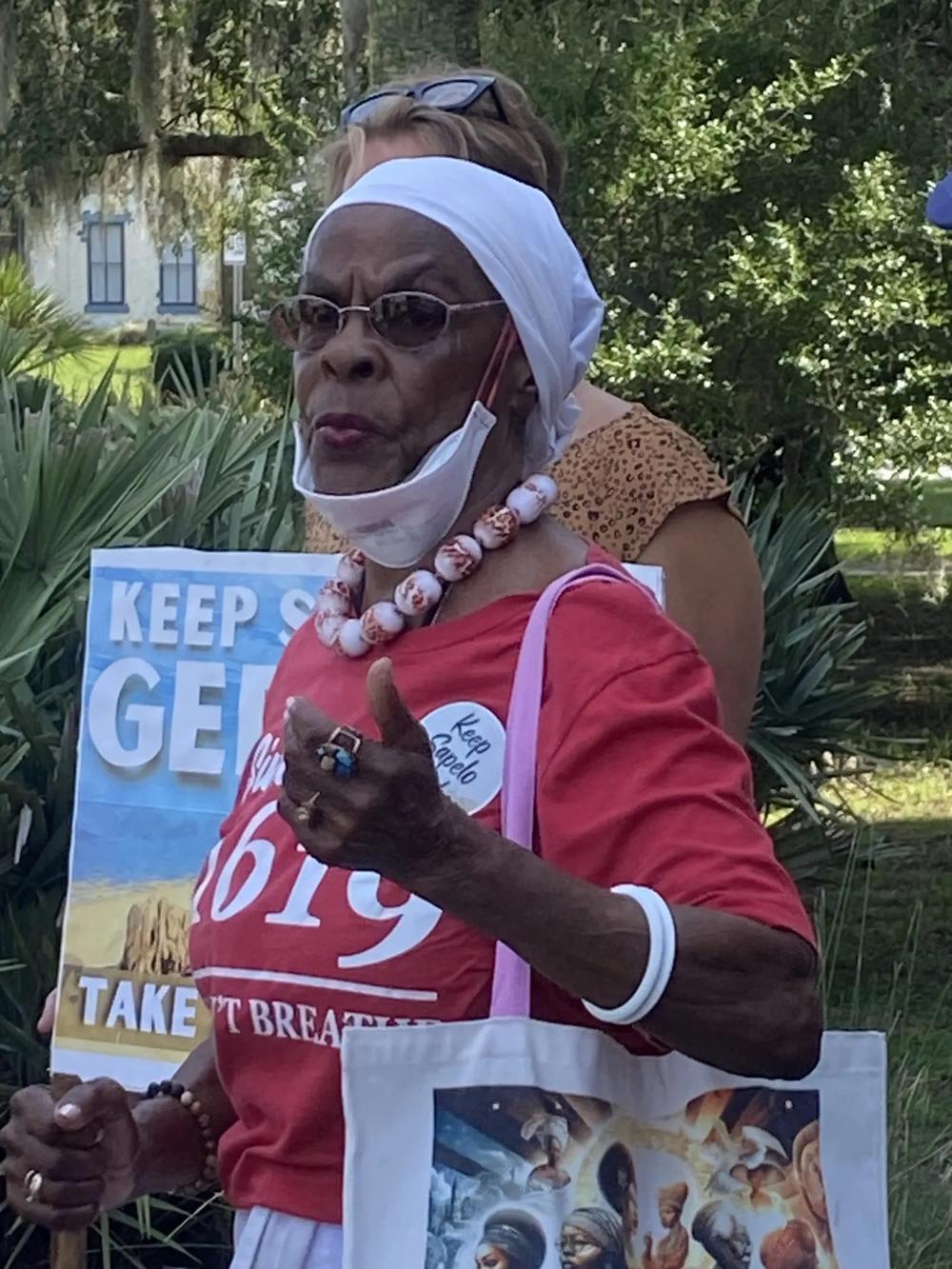
Caption
Josiah "Jazz" Watts holds copies of the petitions with signatures requesting a referendum to repeal the new zoning ordinance affecting Hogg Hummock on Sapelo Island.
Credit: Susan Catron/The Current GA

Josiah "Jazz" Watts holds copies of the petitions with signatures requesting a referendum to repeal the new zoning ordinance affecting Hogg Hummock on Sapelo Island.
Mary Landers, The Current
Community groups in McIntosh County filed a petition in probate court Tuesday to force a county-wide vote on a controversial zoning change on Sapelo Island’s Hogg Hummock.
“This is about us asking our local officials and wanting to work with them, and them not hearing us, not listening to us,” said Josiah “Jazz” Watts, a community leader who also works on environmental justice issues for One Hundred Miles. “So now we are demanding that they hear us, that they listen to us, the voters.”
The Hogg Hummock area is inhabited by descendants of formerly enslaved West Africans and is the last Saltwater/Gullah Geechee community on a Georgia barrier island. The county commission approved zoning changes on Sapelo in September at a meeting packed with about 200 residents, many of whom objected to the zoning and pleaded for greater public input. The new zoning allows bigger, taller houses, which residents fear will force out descendants in favor of wealthy developers.
“This is not the way that our local government should operate for any of us,” Watts said outside the McIntosh County Courthouse where the petition was filed with Probate Judge Harold Webster III. “That decision on September 12, 2023, was not the right decision. So therefore, now, we are compelling the county and demanding a special election on this specific matter.”
Sapelo Island Cultural and Revitalization Society SICARS, the Hog Hammock Community Foundation, Save our Legacy Ourself (SOLO), and One Hundred Miles joined as “Keep Sapelo Geechee” to launch the petition drive in September.
The petitioners based their actions on the “Home Rule” provision of the state constitution that outlines a process for voters to repeal county resolutions, starting with a petition. In a county McIntosh’s size — about 11,000 residents — the petition requires signatures from 20% of the electors registered to vote in the last general election. “In the event the judge of the probate court determines that such petition is valid, it shall be his duty to issue the call for an election for the purpose of submitting such amendment or repeal to the registered electors of the county for their approval or rejection,” Article IV, section 2 of the constitution reads.
Keep Sapelo Geechee used the figure of 8,824 recent voters as its baseline, Watts said. To get to the required 20% with breathing room for duplicates or otherwise rejected signatures, Keep Sapelo Geechee collected 2,300 signatures.
The Home Rule provision of the Georgia Constitution, was used successfully in 2022 in Camden County to repeal the county’s decision to purchase land for its spaceport, quashing that project. Camden County challenged the petition and the referendum in court, but ultimately the Georgia Supreme Court upheld the vote as constitutionally authorized.

Alberta Mabry speaks to a press conference marking the submission of a petition to repeal the new zoning ordinance affecting Hogg Hummock on Sapelo Island. July 9, 2024 McIntosh County Courthouse
Alberta Mabry, a 91-year-old Sapelo descendant, stood outside the courthouse Tuesday dressed in a red t-shirt with the slogan, “Since 1619. We can’t breathe,” and explained why she helped collect signatures.
“I grew up on the Jim Crow laws,” she said. “And I left McIntosh County at a very early age. I came back after I had retired from being away for a few years and I found my community in the same kind of situation that I left.”
The segregation signs were gone, she said.
“But the same hatred and prejudice still resides in our county this very day,” Mabry said. “And that’s why right now, I am so upset, because we have so much corruption.”
Only voters registered in McIntosh County were eligible to sign the petition and had to indicate a physical address that matched their voter registration. Signatures were not accepted electronically, but the petition and form were downloaded from the Keep Sapelo Geechee website and could be mailed in; organizers also mailed petition forms to registered voters.
Emmet Moore, 56, was among those who signed the petition. His grandfather grew up on Sapelo, as did his daughter.
“I try to preserve our culture,” Moore said.
Next steps for the process are spelled out in the Georgia Constitution.
The probate court judge has 60 days after the petition is filed to determine its validity. If the petition is valid, the judge calls for an election, setting the date of the election for 60 to 90 days after the petition is filed. Because elections must fall on a Tuesday, that puts the latest possible date for a referendum at Tuesday Oct. 1, with a required week of early voting beforehand. The countywide vote will be on the single issue of Hogg Hummock zoning.
The question to put before voters is spelled out in the filing: “Shall the Action of the Board of Commissioners of McIntosh County, Georgia, amending the McIntosh County Code of Ordinances Appendix C Sec. 219 HH Hog ‘Hammock District of the McIntosh County Zoning Ordinance be repealed?”
As this process proceeds, so is another effort to reverse the zoning decision. In late May a group of nine Black residents of Hogg Hummock refiled a complaint in McIntosh County Superior Court. They asked the court to reverse the zoning for a number of reasons, including that it “discriminates against the historically and culturally important Gullah-Geechee community on Sapelo Island on the basis of race.”
This story comes to GPB through a reporting partnership with The Current.